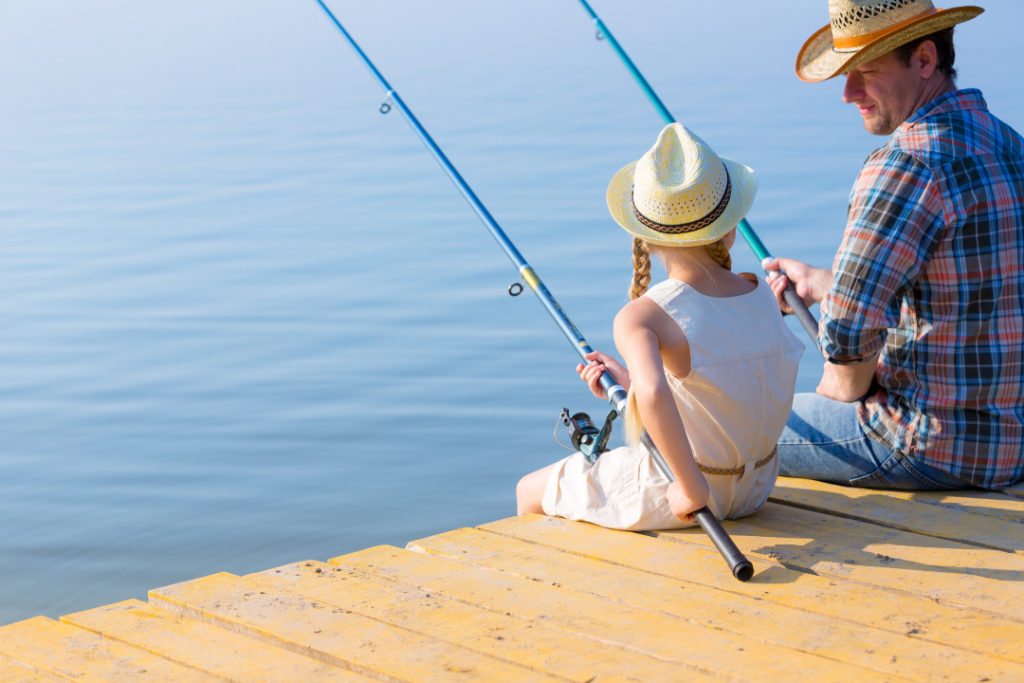Last year, I moved back to the east coast, after seventeen years in a landlocked city. While I now live in Florida, and not my birth state of New Jersey, my house is seven minutes from the beach and the municipal marina for my city. Whenever we drive to that beach, I notice the signs offering chartered boats so people can go fishing, crabbing, or scalloping, and I’m a child again, going on weekend fishing trips with my grandfather.

As I enter my mid-fifties, those memories are more and more precious to me, but equally important are the life lessons I experienced during those early mornings at the fishing pier – lessons that apply both to fishing and to everyday living, and caregiving.
I am sharing them here.
- Be Aware:
Tuning into your surroundings is important when you’re fishing from an ocean pier. Not only do you have to pay attention to boat traffic and the level of the surf, but you have to watch for patterns with the fish – where are they biting, how frequently, what kind of fish? More than once our quest for bluefish yielded small sharks instead.As caregivers, awareness is important because it can tell us a lot about our loved one’s state of mind and physical well-being, especially when they can’t – or won’t – tell us. - Be Patient
Fish don’t have watches, and don’t know your schedule, so patience is important. Sometimes, you may have a bite in a few minutes, and sometimes it will take hours, and getting frustrated won’t help. More than once my grandfather would remind me to sit and breathe and wait for the fish.In caregiving, we must also be patient with our loved ones, and with ourselves. If we’re caring for our elders, they may take longer to do things, and if we’re caring for children, they may be just learning certain tasks. - Be Receptive
The thing about fishing is, it’s not all about the fish. Listening to my grandfather (and sometimes my uncle) tell stories about their childhoods, their time in the military, the biggest fish they ever brought home wasn’t just a way to kill time, it was accepting that they wanted me to know them in new ways.As caregivers, we are often impatient with loved ones who repeat the same stories over and over, but the act of listening is as important as making food or helping with medical care. We all want to be heard. - Be Adaptable
You can’t control Mother Nature, and you can’t force fish to bite, so being able to adapt is important. There were days when our favorite fishing pier was too crowded, so we went to another, and other days when the weather turned foul, and we had to leave early. (A light rain, on the other hand, sometimes brought more fish to the surface, so I’d pull up the hood of my sweatshirt, and my grandfather would re-adjust his hat, and we’d keep going.As caregivers, we are constantly adapting and adjusting. We have to be flexible about schedules, menus, and moods. - Accept Loss
Going fishing and actually catching fish are often not the same thing. There are days when you go home with empty coolers. There are times when you do catch fish, but they’re below the legal limit for keeping, and they have to be thrown back. Accepting that you will sometimes lose the ‘game’ of fishing is an important lesson.As caregivers, the possibility of loss – the greatest loss – is ever present, but there are smaller losses we face, as well. We may lose the battle of wills, we may lose our tempers, we may lose our free time. We have to trust that love, patience, and perseverance will carry us through those times.
Memories of fishing with my grandfather are special to me, as much for the stories he told as for the time we spent together. (I’m less fond of the memories of cleaning the fish we caught.) He died when I was twenty-one, but before then, we’d build up a lifetime of love, laughter, salty skin, scary hats, and fresh fish.
Going fishing, now, means casting about in my memories for a favorite story. What could be better than that?
